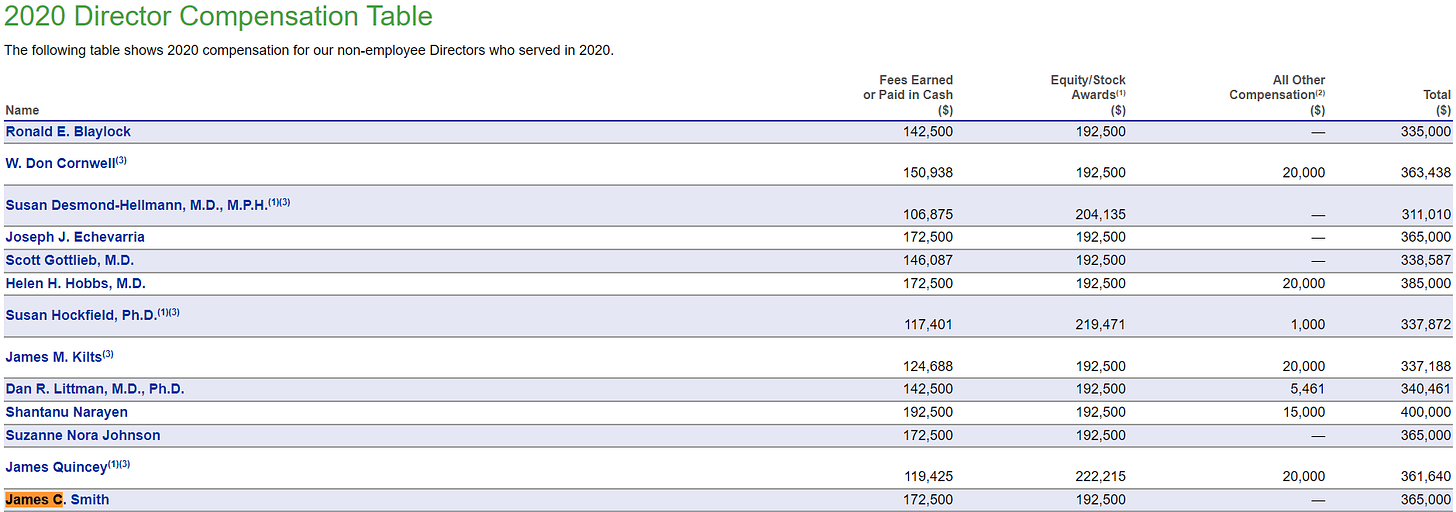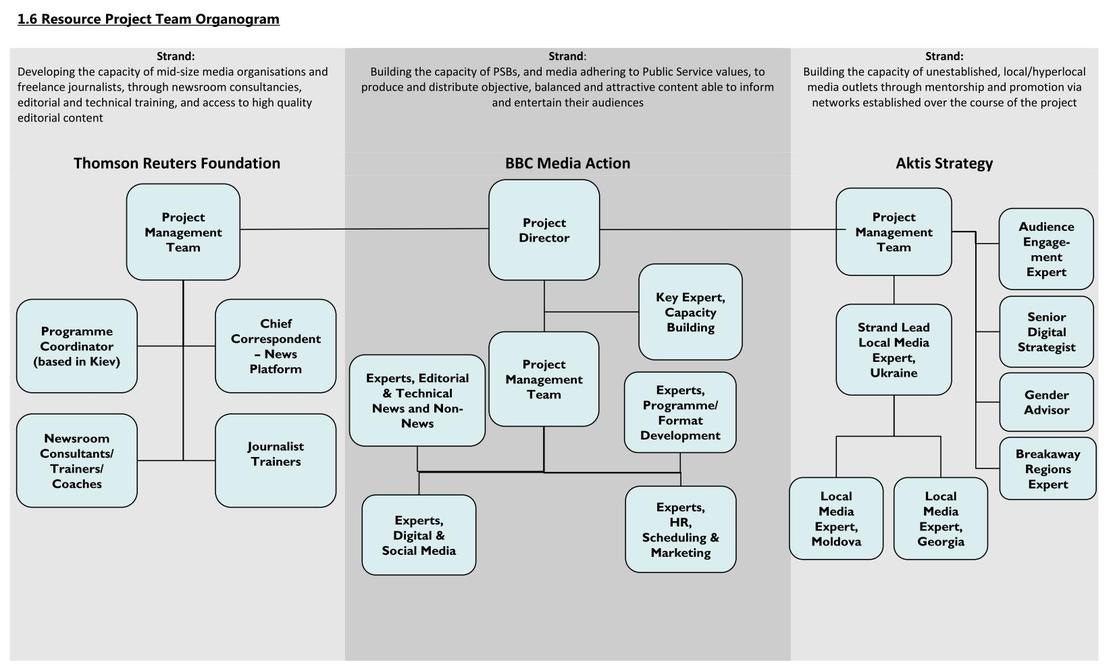James C. Smith: Pfizer's Minister of Propaganda
Exploring the connections between James Smith, Reuters, Pfizer & the World Economic Forum
James C. Smith was CEO of Thomson Reuters Corporation until April 2020, and is currently chairman of the Thomson Reuters Foundation while serving as a board member of Pfizer since 2014. Reuters has failed to disclose this conflict of interest in any of its coverage of Pfizer, contrary to Reuters esteemed Trust Principles which guarantee unbiased, transparent reporting.

James Smith became chairman of Thomson Reuters Foundation April 2020 after serving as CEO of Thomson Reuters main media company since 2012, and has served on Pfizer’s board of directors since 2014, which earned him $365,000 in 2020, including $172,500 in base salary & $192,500 in stock awards, according to Pfizer’s 2020 Proxy Statement filed to the SEC. James C Smith is the chairman of Pfizer’s Compensation Committee which is “directly responsible for establishing annual and long-term performance goals, and objectives for our elected officers”, and is also a member of their Audit and Executive Committees.
Prior to becoming CEO of Thomson Reuters Corporation in 2012, James Smith held executive positions at various Thomson Reuters entities since 1987, including CEO of Thomson Reuters Professional Division & Thomson Learning where he “led a number of professional publishing businesses serving the legal, regulatory and academic markets”. One of Thomson Corporation’s most successful publications is the “Physicians Desk Reference”, a vast index of prescription medications, used by physicians worldwide and is marketed as the ‘Doctors Bible’. The PDR is financed by the pharmaceutical industry and has been criticized for recommending dosage guidelines which ignore the individual needs of the patient, leading to widespread overmedication, increased adverse events, and of course hefty profits for the drug manufacturers. As the key executive at the company which publishes the ‘Doctors Bible’, this may have been where James Smith developed the close relationships with the pharmaceutical industry that eventually landed him a lucrative position on Pfizer’s board of directors.
Within the same month that Pfizer director James Smith became chairman of the Thomson Reuters Foundation in April 2020, the TRF immediately launched the "COVID19 Crisis Reporting Hub", a training course for journalists in Eastern Europe and Africa, instructing them on how to report on COVID19 according to the journalistic standards set by Thomson Reuters Foundation. The COVID 19 Crisis Reporting Hub is partnered with the World Economic Forum, BBC Media Action, National Endowment for Democracy, International Fund for Agricultural Development and Fritt Ord Foundation.
In February 2021, the Thomson Reuters Foundation & the Sabin Vaccine Institute partnered to train journalists on how to report on Covid19 immunization. There is no indication that the journalists enrolled in this program were informed that their training on vaccine reporting was facilitated by a foundation whose chairman is a member of Pfizer’s board of directors. The immunization reporting training course focused primarily on journalists from Eastern Europe, where the Thomson Reuters Foundation has a history of supporting covert propaganda campaigns.
Partners in Corruption
James Smith is also a contributor to the World Economic Forum, and serves on the steering board of their Partnering Against Corruption Initiative. PACI, launched in 2004 is governed by a Vanguard Steering Board tasked to “identify innovative approaches to anti-corruption and set global, regional and industry agendas”. PACI’s 90 signatories include honorable companies like Google, HSBC, UBS, Royal Dutch Shell, to name a few.
During the initial Covid hysteria in April 2020, the World Economic Forum’s Partnering Against Corruption Initiative convened a “Risk Mapping” session focused on “Compliance in the times of crisis” relating to Covid19. One of the risks identified by PACI include “Pressures to conduct procurement faster and weaker due diligence in the public and private sector could raise the risk for conflicts of interest”…
The PACI is co-chaired by Neil Alexander Bruce, CEO of notoriously corrupt multinational construction firm SNC Lavalin, and David Cruikshank, chairman of Deloitte (Deloitte CEO Joseph J. Echevarria is also on Pfizer’s board). SNC Lavalin was infamously found guilty of fraud and corruption by Canadian authorities in 2019 stemming from multimillion dollar bribes to Libyan officials between 2001-2011. Davos latchkey Justin Trudeau pressured his Attorney General Jody Wilson Raybould to halt investigations of Quebec-based SNC Lavalin, and when she refused, she was demoted and eventually resigned. It is surely just another coincidence that SNC Lavalin CEO Neil Alexander Bruce is married to Emma Griffin, a director of Claridge Inc, the investment arm of Justin Trudeaus primary fundraiser & advisor, Stephen Bronfman.
We can rest assured knowing that ethical stalwarts like Neil Alexander Bruce, James Smith and Klaus Schwab are keeping a watchful eye on institutional corruption from their chateaus in Davos.
Reuters & British Intelligence
As mentioned earlier, the Thomson Reuters Foundation has historically been an asset for the UK Government in their international propaganda efforts since the 1960s, according to declassified, and leaked documents. From the 1960s-70s, The British Government covertly contracted Reuters to support an anti-Soviet propaganda campaign under the direction the MI6-linked Information Research Department (IRD). More recently, leaked documents from December 2017 show the Thomson Reuters Foundation applying for a contract with the UK Foreign & Commonwealth Affairs Office who were designing “a programme of themed tours to the UK by Russian journalists and online influencers” seeking to produce “attitudinal change in the participants,” promoting a “positive impact” on their “perception of the UK.” In their application to the UK Foreign Office, the TRF described their history of training journalists in Russian speaking countries to promote “UK cultural and political values” for over 30 years.
A confidential contract between the UK FCO and The Reuters Foundation from July 2019 suggests that the TRF’s bid for the UK Foreign Office’s anti-Kremlin propaganda contract was successful. The UK FCO had a similar yet separate agreement with BBC Media Action to covertly engage with local, ostensibly independent journalists in Eastern Europe to “bring balance and plurality to the Russian language media space”. The leaked documents also show an organizational chart for a propaganda campaign out of the UK’s Foreign Affairs Office, with the Thomson Reuters Foundation & BBC Media Action as key assets in their effort to “counter misinformation” in the Baltic region. It is no coincidence that BBC Media Action, in partnership with the Thomson Reuters Foundation, also runs a Covid19 Crisis Reporting Hub in Eastern Europe.
Clearly the Thomson Reuters Foundation and BCC Media Action are reliable and effective assets in covert propaganda campaigns aiming to create the illusion of consensus under the guise of local journalism. It is worthy noting that both the BBC and Reuters are members of the Trusted News Initiative, the exalted consortium of information gatekeepers who froth at the mouth to censor anyone questioning their authority, especially if you’re a credible scientist.














